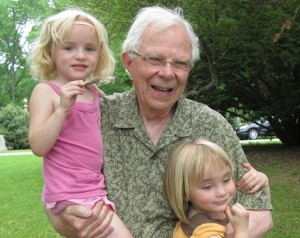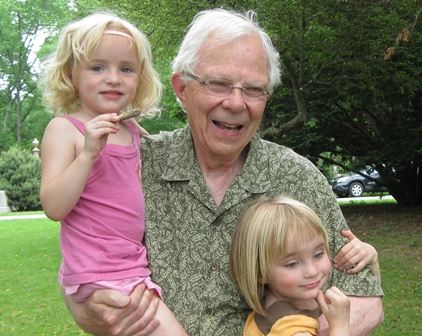 “Grandpa, can I hold your hand?” asks my four-year old granddaughter as we walk on the sidewalk of South Street in Jamaica Plain, Massachusetts. “Of course!” is my enthusiastic response. Soon her twin sister catches up to us and wants to hold my hand as well. Not much can make a grandparent happier that holding hands with his twin granddaughters. Of course, they know that at a street crossing, they must hold the hand of an adult. They’ve been taught that by their mothers.
“Grandpa, can I hold your hand?” asks my four-year old granddaughter as we walk on the sidewalk of South Street in Jamaica Plain, Massachusetts. “Of course!” is my enthusiastic response. Soon her twin sister catches up to us and wants to hold my hand as well. Not much can make a grandparent happier that holding hands with his twin granddaughters. Of course, they know that at a street crossing, they must hold the hand of an adult. They’ve been taught that by their mothers.
“Their mothers” is not a typo. My granddaughters have two mothers. One is, of course, our daughter. They live in a neighborhood where a two-mom family doesn’t raise eyebrows. Their preschool has two-mom families, two-dad families, single-parent families, mom-and dad families. It’s just the way things are. The church that our daughter and her spouse attend has the same family diversity. The lead pastor is openly gay and lives with his same-gender partner. It is not an issue! A walk in the park reveals ethnic diversity and different family constellations. Could this be a fulfillment of the prayer we repeat Sunday after Sunday, “Thy kingdom come, thy will be done on earth as it is in heaven?” I’m confident the answer is a resounding, “Yes!”
Yes, the word “spouse” was not a mistake either. Our daughter and her partner were united in marriage by a Presbyterian clergywoman who later made national news when she was reprimanded for performing another same-gender wedding. (Charges against her were recently dismissed.) It was a lovely ceremony with about 100 family members and friends gathered to celebrate the occasion. Incidentally there were eight ordained Covenant clergy at that wedding as well as several members from the congregation that I previously served. Everyone from our family was in attendance and wonderfully supportive of the newly married couple. It was a great party! It is legal in Massachusetts for same-gender couples to be married. Shouldn’t it be that way everywhere?
Well, we mean to do our part! This past June my wife and I co-hosted a house party sponsored by Mainers United for Marriage. This is a coalition of groups banded together to support the ballot initiative this November to allow same-gender marriage in the State of Maine, which was defeated three years ago. We and many others hope and are working for its success this time. We believe that folks are increasingly aware that being gay or lesbian is innate and not a choice and that no one should be denied a lifelong commitment through marriage.
The picture may be becoming clearer–not only am I a grandfather and a father but also an ordained Covenant pastor, a graduate of North Park Seminary (Class of 1964), and have served Covenant churches for almost 30 years. Furthermore, I am passionately committed to the notion that people, no matter what their God-given sexual identity, have the right to formalize Their love for another person through marriage. As for many, this stance and these convictions didn’t just happen. There are stories, events along the way, that helped to mold what I stand for now.
The religious stance in my childhood home was conservative and evangelical. We didn’t talk about sex and most certainly didn’t discuss alternative sexual identities. I have faint recollections of high school locker room comments about someone being “gay,” but I’m not sure I was aware of what that meant. Reflecting on my two years at North Park College(1956 – 58), I don’t recall thinking of classmates being lesbian or gay. However as time went on and my awareness progressed, I began to hear that some were. Later, with further thought and exposure, my rational response to the “gay issue” was one of openness and acceptance, although my visceral reaction to same-sex couples showing affection was discomfort.
Another “marker event” occurred in March, 1987. I had served the Covenant Congregational Church of Waltham, Massachusetts for 13 years. Two other churches, both American Baptist, and our church sponsored a Lenten Study Series entitled, “A Christian’s Look at Social Issues.” I was the primary organizer. One session topic was “Alternative Life Styles—Homosexuality.” Twenty five years later that doesn’t sound very dramatic, but if any readers can place themselves in that moment in time in a Covenant church along with two Baptist churches bringing in a resource person (an ordained Southern Baptist and PhD candidate at Boston University) to address this topic and lead a discussion, you realize that although it probably wasn’t quite “cutting edge,” it wasn’t far behind.
My exposure and comfort level were greatly enhanced in the early 1990’s as my wife worked in the graphic arts department of a nationally known magazine. Several co-workers were openly gay. Often at social gatherings with these folks we would be in the distinct minority as a straight couple.
Many of you have read Lynda McGraw’s poignant piece “My Beloved Brother” on Coming Out Covenant. I presided at her brother’s memorial service in the Covenant Congregational Church of Waltham in 1996. Mark had been in a confirmation class that I taught. His parents were close friends, so I had been aware of Mark being gay through many conversations with them. I knew that he had become ill and suffered beside them. I remember vividly gathering with Mark’s family and his partner, James, to plan the service. I wanted to be fully supportive. I hope that I was. It was a beautiful moment in the sanctuary of the Waltham church.
Because I’m a Covenant pastor, some will wonder how I can assume this open, affirming stance on LGBT issues. How can I disregard Scripture passages that seem to condemn homosexual behavior? My answer is neither profound nor unique. I simply ask, “How can we expect the biblical authors to have a positive approach to homosexuality without the evidence and insight we have now?” Why can we not label these verses as culturally tainted as are passages presuming that the earth is flat, slavery is acceptable, women must not speak in church (certainly not with an uncovered head), divorced people must not be pastors, etc., etc.? Peter Gomes’s The Good Book brought clarity to my thinking about these Biblical injunctions. He calls typical church views of homosexuality “the last prejudice.” I’m not sure I agree it’s the “last prejudice,” but it’s surely a prejudice the church should fight to eradicate. I’m absolutely convinced that, facing a choice of Scriptural interpretation, love of neighbor trumps everything.
Obviously I am very troubled by the current stance of our denomination, but I am confident that as our society progresses in understanding and affirmation, so the Covenant church will eventually grow. Other denominations have taken the lead and yes, have paid a price, but I suspect God cares more for people and principle than for impressive statistics!
In my 74 years, I’ve shed notions here and there and acquired new understandings along the way. I thank God and the people who have aided my growth. I intend to work and support to the best of my ability in my remaining years those principles that have become part and parcel of my being. Of course, there will always be time to enjoy my beautiful granddaughters, watch them grow and become gracious women, and be thankful for their mothers who have given them life and, like all mothers, want all that is good for their children. That makes me as happy as my grandaughters wishing to hold my hand does now!
